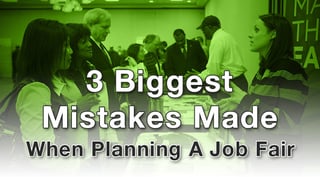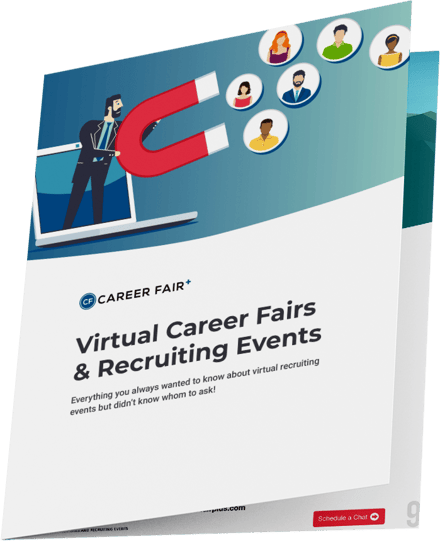 When you go through the trouble of planning a job fair, you want it to be successful. However, with so many details to juggle, it's easy to make mistakes. Luckily, most mistakes are easy to fix or work around. But beware, there are some mistakes that can impact the success of your job fair. Here are three of the biggest makes you need to avoid.
When you go through the trouble of planning a job fair, you want it to be successful. However, with so many details to juggle, it's easy to make mistakes. Luckily, most mistakes are easy to fix or work around. But beware, there are some mistakes that can impact the success of your job fair. Here are three of the biggest makes you need to avoid.
Not planning far enough in advance
The simple truth is that you are not the only organization planning a job fair. When you want to get recruiters from top employers, you need to get on their calendars as soon as possible. That means at least 4 to 6 months in advance. If you don't get your fair on their calendar, you are going to end up with fewer attending employers.
Time also plays a factor when it comes to reserving your venue. If you don't want to settle for your second or third choice then you need to plan early. Having the right venue is critical so you will want to plan early to ensure you land the right one.
As an added bonus, the extra time gives you room to make adjustments as needed. Not everything is going to go as planned. When you plan well enough in advance, problems will become apparent with time to make changes as needed.
Not having the right venue
Ideally, your venue should be big enough for all the employers to fit comfortably while allowing movement space for the students and other job seekers. Plan on break space for both recruiters and students, a place to just sit and catch the breath. The venue should have restrooms handy to both recruiters and students.
Trust us when we say that everyone will know if the venue is too small. The recruiter booths will be too close together, making private communications impossible. A space that is too small will feel overcrowded which can result in attendees feeling claustrophobic and possibly be the reason they choose to leave your fair early.
Conversely, if the venue is too large, you may be paying a higher price than you intended. This can result in restrooms or break areas at inconvenient distances.
Of course, there are other potential venue problems, besides size. If the venue is in a hard to reach location, it could drive down the number of attendees.
Not marketing the event effectively
For a career fair to be successful, you need to get as many qualified attendees as possible. That means marketing it effectively.
You need to give students enough time to work the fair into their schedules. That means starting the marketing at least 4-6 weeks in advance if not earlier. That way, if they need to arrange transportation or time off, they have the time to make it happen.
You need to get the marketing in front of your intended audience. Fliers posted around campus are a great way to catch people's attention. It's 2017 so don't shy away from using digital methods such as social media. Facebook is a great way to get the word out. Creating a web page with all the details will give students a reference point. TV and radio ads are also effective options.
Knowledge is power and what you do with that knowledge is up to you. However, we believe that just being aware of these potential pitfalls will help you make your fair a success.

